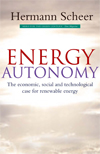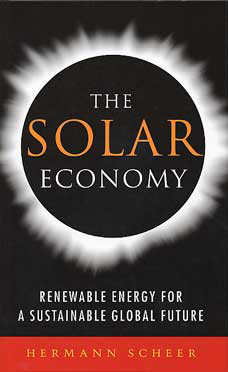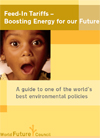Articles
 Article published in UNEP Our World Magazine, December, 2005
Article published in UNEP Our World Magazine, December, 2005Hermann Scheer describes how photovoltaic solar energy conversion offers humanity a unique opportunity and calls for political programmes to promote it. Photovoltaic energy (PV) is the primadonna of renewable energy technology. Currently, it only generates just a small part of total renewable energy supply, less than wind, hydro power or biomass. But it also bears by far the biggest potential - larger than that of all other renewable energy sources, larger than anything to which fossil fuels and nuclear power could ever aspire. Photovoltaics are the most promising of all energy technologies, giving us the best option to overcome global energy crises.
 Article published as an extract of Hermann Scheer: Energy Autonomy. The Economic, Social and Technological Case for Renewable Energy, December 2006
Article published as an extract of Hermann Scheer: Energy Autonomy. The Economic, Social and Technological Case for Renewable Energy, December 2006
“Solar or nuclear” was the title of a debate on Austrian television I conducted several years ago with a well-known professor of atomic physics. The professor was not one of those members who likes to whitewash the risks of nuclear energy. But he was convinced of the indispensability of nuclear energy. He regarded renewable energy as something that (unfortunately) did not have enough usable potential to satisfy people’s energy needs. His remarks on the subject amounted to a grab bag of grotesque assumptions, all of which were easy to refute with a few empirical facts – like his assertion that the energy expended on producing a solar facility would be higher than its energy output. After the broadcast he told me in a voice that was both moved and moving: “Measured by what you have said, my professional life was misguided.”
 Article published in Die Zeit, July 29th, 2004
Article published in Die Zeit, July 29th, 2004 Nuclear energy is still too expensive and too dangerous. Huge amounts of water are needed in a time of increasing water shortage. Uranium supplies are limited. In Europe $1 trillion was spent on nuclear research while renewable energy fell by the wayside.
 Article published as Foreword of "The Solar Economy", May 2004
Article published as Foreword of "The Solar Economy", May 2004
‘Let’s improve the atmosphere’ - that was how the German government greeted delegates to the conference on climate change held in Bonn in July 2001, the eighth such conference since 1992. Yet even before the conference took place, it was abundantly clear that even if the Kyoto Protocol were to be implemented in full through to 2012 without being watered down, the most it could achieve would be to bring emissions back down to the already dangerously high levels of 1990. On the basis of existing agreements, the objective was no longer to improve matters, but merely to prevent them getting any worse. And while the negotiations rumble on, the climate situation remains precarious. A short study undertaken by the Wuppertal Institute predicts that by 2012, global emissions will actually have risen by ten per cent. The Kyoto debate would appear to have run its course.
 Article published in EUROSOLAR (Ed.): The City - A Solar Power Station. 6th European Conference Solar Energy in Architecture and Urban Planning, Bonn, September 12th - 15th, 2000
Article published in EUROSOLAR (Ed.): The City - A Solar Power Station. 6th European Conference Solar Energy in Architecture and Urban Planning, Bonn, September 12th - 15th, 2000For as long as in the history of human settlement there were no efficient energy systems, no rapid and large-volume transport capacities and no traffic infrastructure, areas of settlement had to remain directly linked to the areas where energy was generated and food produced. The fields and forest regions that supplied the energy resources for the cities in pre-industrial times had to be some 40 to 100 times larger – depending on soil quality and climatic cultivation conditions – than the actual areas of settlement. For as long as this natural limit to growth was respected, there was little likelihood of supply crises. Economic conditions seldom permitted excessive wealth; yet on the other hand, the only real threat to stability was posed by the effects of wars.
 Article published in ZNER 2/1998
Article published in ZNER 2/1998 EU Feed-in Directive and Feed-in Legislation for Electricity Generated with Renewable Energy Sources versus Introduction Ratios.
Legal, energy and environmental issues in market access for renewable energy sources
The ongoing debate on the constitutional tenability of Germany's feed-in legislation for electricity generated with renewable energy sources (RES) - i.e. the question of its legality "at bottom" - and the operational or market economy appropriateness of the tariffs it contains - i.e. the question of their legality "in amount" - has reached a new dimension with the now beginning discussions about implementing the EU Commission's White Paper on renewable energy sources (inter alia with the aim of increasing the share of renewables in the EU's energy supply to 12 % by the year 2010) and the recommendation it contains on an EU feed-in directive.
 Article published in Scheer, H. / Ghandi, M. / Aitken, D. / Hamakawa, Y. / Palz, W. (Ed.): The Yearbook of Renewable Energies 1995/96: Solar Energy – What are its Driving Forces ?, London, 1995
Article published in Scheer, H. / Ghandi, M. / Aitken, D. / Hamakawa, Y. / Palz, W. (Ed.): The Yearbook of Renewable Energies 1995/96: Solar Energy – What are its Driving Forces ?, London, 1995Introduction
Many people think the question of the share of renewable energies in the energy supply is merely scientific. The truth is: the discussion of the potential of renewable energies is an almost entirely political one. It cannot be seriously denied that there is a natural renewable energy potential sufficient to satisfy forever the energy needs even of an increasing world population. Neither can be denied that there are numerous - already applied - technologies for using this potential. Therefore it is only a question of how many economic and political initiatives for the utilization of renewable energies are input until there is output completely meeting the energy needs.


